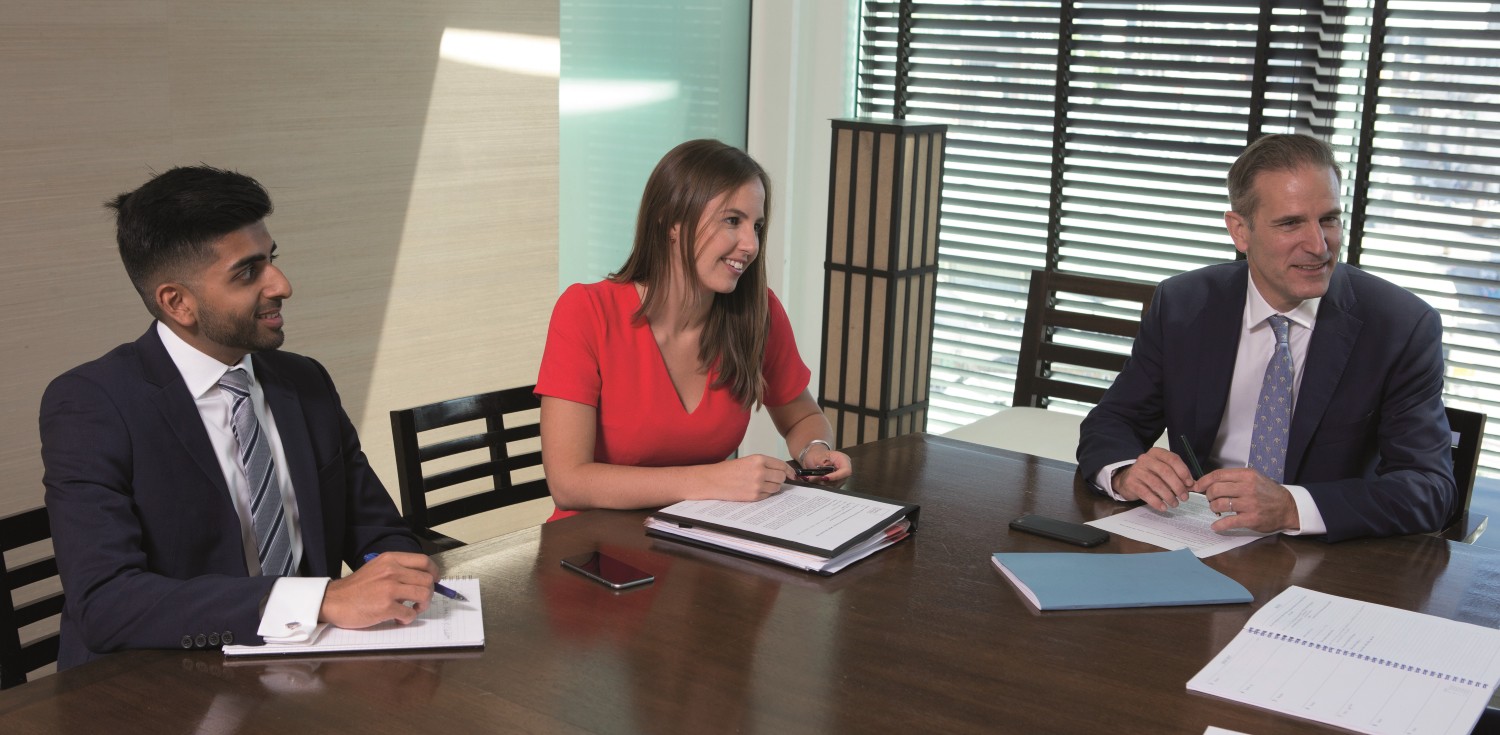
The recruitment team at the firm is exceptional – they are friendly, approachable and professional in their dealings with future joiners and trainees.
With its global reach and a reputation for technical excellence, Hogan Lovells stands apart from all but a few elite peers. One of the global elite, the firm is the product of an unprecedented transatlantic merger in 2010 that brought together two law firms with extensive, global connections and credentials.
Since 2010 the firm has gone from strength to strength – today it offers the full suite of commercial legal services from 49 offices in 25 countries. Its success is underpinned by world-class – and now LCN Award-winning – recruitment and training to help ensure that the next generation of Hogan Lovells solicitors maintain and develop the firm’s global status. This excellent recruitment programme is seen as a key part of the firm’s activities, as Louise Lamb, partner in the financial services disputes team and current graduate recruitment partner, explains: “We are fortunate to have a large number of people who are enthusiastic about devoting time to our graduate recruitment activities, from campus visits to assessment days and interviews. From partners to trainees, they give a lot of their time to help with a very busy recruitment calendar.”
If you are a prospective trainee looking for a combination of really extensive global reach, breadth of practice, a supportive and collaborative culture, and a first-class legal brand in the eyes of clients, then come to Hogan Lovells
However, getting to know candidates in some depth by having plenty of dedicated people involved in the process only gets you half way to a genuinely exemplary recruitment programme. David Moss, training principal and partner, explains how Hogan Lovells ensures that fairness and consistency are paramount, even across such a large number of interviewers and assessors. “All partners on the graduate recruitment panel have had training in the firm’s preferred approach to interviewing to ensure that the process is consistent for each candidate,” he maintains. “As well as motivation to join the legal profession and to join us specifically, we are looking to assess whether a candidate can think on the spot and articulate thoughts coherently. We also look for some commercial awareness – not of the type that you would expect of a veteran investment banker or economist, but basic business-related common sense.”

The style in which the assessment process is conducted is also important – the firm eschews the combative approach popularised in the public imagination by TV programmes such as “The Apprentice”. “The process – including the interview stage – is not about making candidates feel uncomfortable or trying to trip them up,” Louise explains. “Our approach is twofold; we want to test candidates’ abilities and strengths, and to take them outside of their comfort zones to see how they think on their feet. This means that we ask fairly probing questions about the topics we cover in interviews, but we do this in a way which is supportive and which encourages the candidate to shine. In our experience, candidates tend to enjoy being stretched and challenged, as long as this is done in the right way.”
Adeela Khan is a current trainee in the litigation team, whose memories of the assessment process are still relatively fresh. She first encountered Hogan Lovells while studying for her Graduate Diploma in Law in 2014. “It was perhaps quite an unusual connection,” she recalls. “I was still undecided about where I wanted to train and was volunteering at the National Pro Bono Centre in London at the time, where I was working with the Access to Justice Foundation. I got involved in a campaign called ‘It’s Not Just Peanuts’ – the initiative was all about encouraging firms to donate unclaimed client account money to access to justice causes. When I asked about how the campaign originated, I learned it was the brainchild of Hogan Lovells’ pro bono team. Everyone at the centre knew that I was interested in career opportunities at corporate firms and encouraged me to apply. After that, everything seemed to fall into place – Hogan Lovells was the first corporate firm that I applied to for a training contract and was also the first to invite me to an interview.” The firm has always taken its social responsibility seriously. It was the first firm to hire a dedicated pro-bono manager – 20 years ago.
As well as motivation to join the legal profession and to join us specifically, we are looking to assess whether a candidate can think on the spot and articulate thoughts coherently
The process which Adeela experienced remains the same today, both for applicants to the firm’s vacation schemes and those who apply directly for training contracts. Her initial application was reviewed, before she was invited to the next stage – a telephone interview and an online version of the Watson Glaser Test, which examines candidates’ critical thinking skills (skills highly relevant to the role of a lawyer). Following this she was selected as one of the six to eight candidates invited to a full day assessment day in the firm’s London office. “Although I – and probably many of the other interviewees – was nervous at the start, everyone we met was welcoming, and I got the feeling that the process was about getting to know us, rather than looking for faults. This made me feel calmer and able to show my skills and personality at their best. The assessment day began with a welcome from the graduate recruitment partner at the time, Tom Astle, who put us at ease and gave an introductory talk about the firm’s work and clients.”
A pen-and-paper variant of the Watson Glaser Test came next, followed by a group discussion on a business-related topic that also looked at how candidates would work in a team and group situation. Interviews took up the bulk of the afternoon, the first with two partners. “I remember the experience very clearly and I regularly say hi – and ‘thanks again!’ – to the partners from the competition team who interviewed me,” laughs Adeela. “I was asked the kinds of question that you would expect, such as ‘why law’ and ‘why Hogan Lovells’, but overall they were mainly interested in hearing a bit more about me and my experiences up to that point, as well as what departments I would be interested in sitting in as a trainee. It was an engaging, stimulating conversation, not an inquisition.”

The penultimate part of the day was a situational interview with two senior associates, who asked Adeela how she would respond in certain day-to-day situations she might encounter as a trainee, all of which were lifted from real life examples that trainees at Hogan Lovells have encountered. “I think that the questions were designed to draw out realistic responses – I didn’t feel that I was expected to present myself as someone who would live in the office and abandon any life outside work.”
Adeela did not have to wait long for feedback. “I got my offer just a few hours after the assessment day ended,” she explains. “I was called by one of the partners while I was at the gym to tell me the good news – it was a really nice touch that he called me himself, so soon after the interview.”
All future trainees complete the seven and a half-month accelerated Legal Practice Course (LPC) together at BPP Law School. The first part of this teaches the core requirements found on any LPC programme, while the optional electives which comprise the second part serve to prepare people for life at Hogan Lovells. “We require future joiners to complete electives in corporate transactions, debt finance and equity finance,” David explains. “They are really demanding electives and we update them continuously. Underpinning this is a desire to get people as prepared as possible for work at the firm, where they will be required to complete at least one seat in each of the corporate, finance and dispute resolution departments. By the time trainees join, they have undergone a pretty rigorous vocational course which sets up them up for work in a transactional, finance and litigation practice.”
The firm keeps in close touch with all soon-to-be trainees; in Adeela’s case it also kept in special contact to ensure that her visa requirements went through without a hitch. “I first moved to the United Kingdom from Pakistan as an international student and now I’m an international worker,” she explains. “It was reassuring that Hogan Lovells regularly checked in with me and provided support throughout the process of securing a work visa.”
Reflecting on her journey so far, Adeela enthuses that “the recruitment process and my experience since joining have definitely exceeded expectations. Before starting, I knew I was going to be working with high-quality, household name clients and that the work itself would be challenging, but I didn’t know just how good the reality of working at the firm would be – everyone is approachable and inclusive, so there is a real sense of shared goals and teamwork. As an international worker, I was daunted at the prospect of working in England because I didn’t know what the atmosphere would be like, but Hogan Lovells is very inclusive and diverse, and there is an international outlook – we are constantly working with our colleagues in other offices all over the world on transactions which often have little to do with London other than the fact that they are governed by English law.”
To sum up the appeal of the firm to an aspiring lawyer, Louise draws on her own experience. “If you are a prospective trainee looking for a combination of really extensive global reach, breadth of practice, a supportive and collaborative culture, and a first-class legal brand in the eyes of clients, then come to Hogan Lovells,” she says. “I would be hard pressed to name any other firm which offers quite that combination. If you asked me why I’m here, it is because I simply couldn’t do better quality work anywhere else in the City in such a supportive environment. For me, that’s a winning combination.”

Best Recruiter – Large City Firm
The recruitment team at the firm is exceptional – they are friendly, approachable and professional in their dealings with future joiners and trainees.

